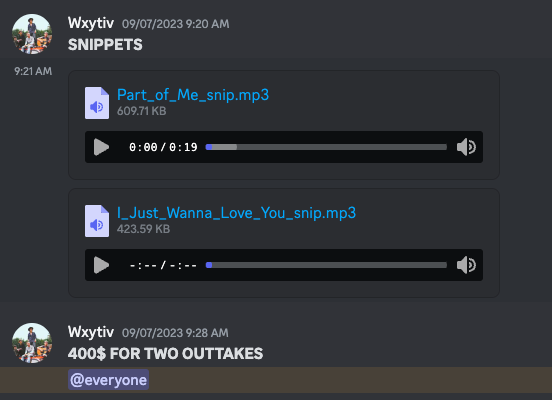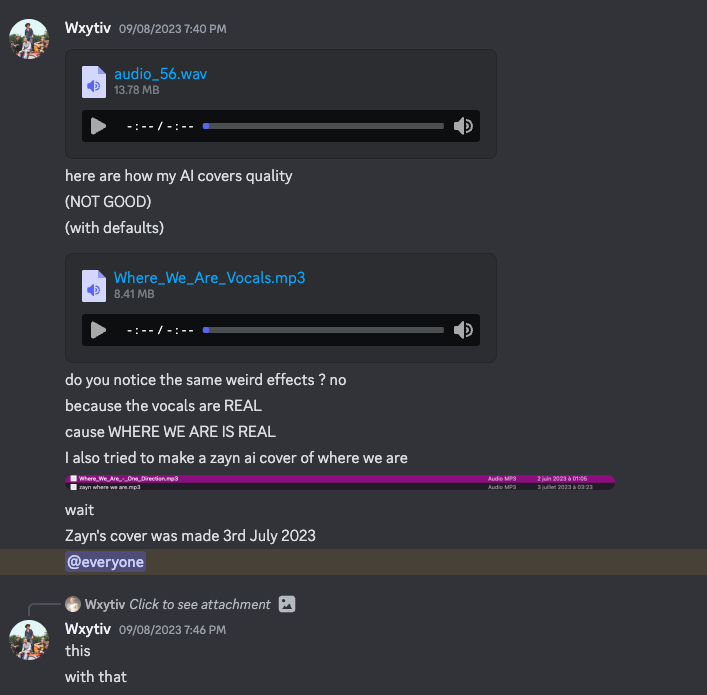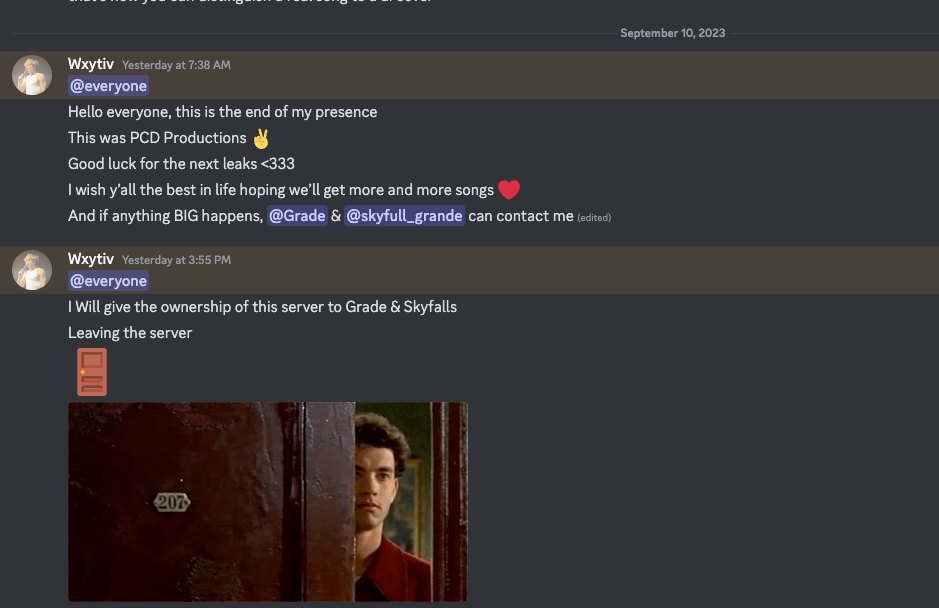Discord communities within the Harry Styles and One Direction fandom are tearing themselves apart over “leaked snippets” of supposed demo songs that may or may not be AI-generated and are being sold to superfans for hundreds of dollars each.
The controversy has turned into a days-long crowdsourced investigation and communitywide obsession, in which no one is really sure what’s real, what’s fake, whether they’re being scammed, or who or what made the songs that they’re listening to.
Over the last few weeks, a flurry of Harry Styles and One Direction snippets—which are short samples of a track designed to prove legitimacy so people will pay of the full thing—have begun popping up on YouTube, TikTok, and, most importantly, Discord, where they are being sold. The problem is no one can tell which, if any, of the songs are real, including AI-analysis companies who listened to the tracks for 404 Media.
“400$ FOR TWO OUTTAKES,” Wxytiv posted in a Discord beneath two snippets called Part_of_Me_snip.mp3 and I_Just_Wanna_Love_You_snip.mp3. In another Discord, they posted multiple “Announcements” per day teasing the release of leaked tracks and repeatedly threatening to leave the Discord forever if people don’t show sufficient deference to them: “Would y’all like to proceed to a group-buy for Don’t Let It Break You Heart multitracks + 2 other version ? 125/$250.” In a separate but connected Discord called THEFINAL, users are directed to PayPal money to a few different accounts to buy the full songs: “I’m sending $1 but I’m sending more when I get paid sorry,” one user posted.
Meanwhile, Styles fans are readily sending money via PayPal to a series of middlemen who claim to have the full tracks. They are also dissecting copyright databases looking for any evidence of the songs’ existence, checking to see if the snippets are deleted from social media via copyright takedown from the rights holders as “proof” they are real, and reaching out to anyone associated with One Direction in an attempt to try to learn more information about the songs.
The people selling these songs are also posting both snippets of what may be legitimate leaks as well as snippets that could be AI-generated, interspersing songs that are possibly AI-made with tracks that could possibly be real, unreleased songs. To complicate matters even more, the same people who are selling leaks they insist are genuine are also posting tracks they disclose are AI-generated in an attempt to prove their leaks are real. Their argument is that the AI tracks sound bad in contrast to the “real” leaks, therefore proving they’re authentic.
“here are how my AI covers quality (NOT GOOD),” Wxytiv, one of the sellers, posted, before posting what they claim is a real leaked song for comparison. “Do you notice the same weird effects? No because the vocals are REAL.”

The development highlights just how complicated the underground leaked song industry has become, and also shows how sophisticated some AI music has become, with the human ear sometimes no longer able to hear a high-quality fake.
For weeks, the moderators of a Discord server called One Direction Hub have been fundraising “group buys” of Harry Styles and One Direction demo songs, unreleased tracks, and outtakes. At best, the sellers in these Discords are selling unreleased tracks that have been stolen from the artists. At worst they are selling total fabrications.

As you might expect, this practice is controversial, and some fans are skeptical. Two users in particular, Liz and Haley, who alerted 404 Media to the sale of these tracks and who asked to use their first names only because they have been doxed and threatened by moderators and users of the community, have been trying to warn others that the songs might be fake.
“Initially when we heard [a leaked song called] Where We Are, we felt like something was off, but couldn't quite place it,” Liz told me in a text chat. “That was until my girlfriend, Haley, realized that parts of the song sounded like 3 other One Direction songs had been manipulated and spliced together. To my knowledge, the band never reused stuff like that. Also, we've seen demos leak before, but we'd never seen a demo of a full-length track for One Direction with all five parts recorded.”
Liz and Haley have been documenting all the reasons they think some of the songs are fake in a series of Twitter threads, which have been repeatedly posted in the Discord and, in turn, have made the people selling the songs very angry.
In Discord, another moderator asks everyone in the server to report Haley’s Twitter account: “I want you all to report this account, they said they have a Google document on our leaks are fake/ai they are wrong … never seen anyone more desperate for clout.”
“According to 2 LITTLE BITCHES in this server, claiming the songs I’ve been hardworked to organize group-buy, getting obtained, leaked for the fans ARE FAKE with proofs that AREN’T CONSTRUCTED at all,” Wxytiv posted, referring to Liz and Haley. “All the money have been always sent to all sellers and never put in my bank account, I always did everything for you all. I am really heartbroken there are horrible people like this.”
Wxytiv told members of the Discord that “i’m even risking my own life & security for these unreleased songs” and stated repeatedly that they were mad that some users were questioning the legitimacy of them and their commitment to the Harry Styles fandom.
Eventually, Sunday night, Wxytiv announced they were leaving the community they had created, which has about 600 members: “Hello everyone, this is the end of my presence,” they wrote. “I wish y’all the best in life hoping we’ll get more and more songs <3. Leaving the server.” They then posted a gif of a slowly closing door.

After Wxytiv left the community, I reached them on Discord. They insisted none of the songs are AI generated, that they are essentially a middleman in the enterprise, and said “many of the unreleased songs are coming from multiple hackers, they are obtained because of email scams, phishing attacking the producers or artists etc.”
They then pointed me to a tweet they made noting that, with “One Direction, it is SO EASY to recognize what is real / fake.” Wxytiv told me they left the community because “I have a new life starting” and being a part of the community had become “overpressuring cause I’ve been called out by people that the songs I helped people to get were fake (they’re real; they’re just dumb).”
The entire situation is complex and messy, but it’s just the latest evolution of a long history of supposed “leaks” being sold and traded in the online underground. Superfans of One Direction and Harry Styles are constantly seeking rare, unreleased, alternate versions, and demo versions of songs that may or may not actually exist. The “leaks” community has spun up to serve these people (and to serve fans of all sorts of artists). These communities often do something called a “group buy,” where a group of people crowdfund money to someone who has somehow obtained a leaked song, and then people who donated to buy the song get to download it. Through this process, a song can leak more widely, or they can become “vaulted,” where people who pay for the song get it, keep it for their own personal collections, and don’t share it with the masses.
When snippets of the songs (or full songs) are released, fans pour over every detail, trying to determine where it came from, when it was recorded, which “era” of Harry Styles’ vocals it has, how it was leaked, which musicians recorded which parts, etc. For hours Sunday, fans in the server were trying to determine the identity of someone named “Spike,” whose name was in one of the metadata of one of the tracks, and suggested it might be a record producer and mixing engineer named Spike Stent.
Fans have also tried to track down who a possible drummer on a specific track might be in attempts of asking them if the track is real or not. Some users have pointed to the fact that some clips that have been uploaded to social media have been hit with copyright takedown requests as evidence that they are real. This means nothing, for what it’s worth; the Recording Industry Association of America has regularly taken action against known AI-generated songs. The RIAA declined to comment for this piece.
Fans have also been looking up the credits in songwriting databases to try to prove the legitimacy of specific tracks. Liz says they believe that the sellers of these songs may be using the databases to learn how to tag specific AI creations: “From what I gather, it seems like the creator(s) of these AI leaks are using the databases to find titles of songs and build the song off of the title,” they tweeted. “They use this to lend credibility to their claims that the songs are real because these songs DO exist according to that information; they just aren’t the songs that they are selling.”
These sorts of communities exist across all media types, all fandoms, and are a long-held tradition. Rare video game ROMs are traded on invite-only game forums, some private movie collection torrent sites will only let you join if you contribute a rare movie to the community, and music leaks all the time.
The advent of AI-generated songs, and the rapid improvement of AI, have made music leaks in particular far more complicated, and have made it even more likely that people trying to buy leaks are actually getting scammed. In May, a scammer selling AI-generated Frank Ocean “leaks” on Discord made thousands of dollars, then disappeared. The problem is that AI-generation tech is very good, and these communities are filled with superfans who are desperate for any new or rare material from their favorite artists. They are primed to want to believe tracks are real, and, unless the artists themselves say something, there is very little way of knowing whether they are real or fake.
A few new snippets of Harry Styles tracks have been posted almost every day over the last few weeks. The sheer number of new Harry Styles “leaks” has become a meme in the fandom. A sampling of recent tweets: “Me opening Twitter to Harry's 150th unreleased song leak this month”; “Hahaha so real! WTF is going on?”; “ready for whatever the next harry leak may bring”; “….. we are getting way to much unreleased recently what the fuck is happening.”
ready for whatever the next harry leak may bring pic.twitter.com/kcS6RZKN1P
— sanya (they/them) (@gettingemtional) September 10, 2023
So, are the songs real or fake? AI detection companies are split, and say that some of the samples are probably from real songs and others are possibly not. Either way, the mere specter of AI has fully split the fandom, and is driving people nuts.
Ben Colman, Co-Founder and CEO, Reality Defender told 404 Media that “models used to deepfake voices are the same or similar to models used to deepfake vocals in AI-generated music. Though our system pinpoints some of these files to be in line with the deepfake voices we detect every day, we have not yet tuned our platform to be as sensitive to music as it is with voice deepfakes and real-time manipulated speech.”
When 404 Media asked Rijul Gupta, founder of Deep Media, a deepfake detection company that works with the Department of Defense and the United Nations, to analyze some of the posted snippets, he said at least some of them sounded legitimate, while others seemed more “sketchy.”
“Our system came back and said that these are most likely real,” Gupta said about two snippets posted to the Discord and on social media called I Just Wanna Love You and Where We Are. “I also listened to them myself. And given my own, you know, ability and understanding of the technology. I actually also think these are real, there are certain usual hallmarks of AI-generated voices and songs that don't seem to be present here,” he said.
As part of its process, Deep Media’s detector spits out a Mel Spectrogram, which is a visualization that has been used by researchers to detect AI-generated audio. Mel Spectrograms can be used to detect AI-generated artifacts and distortions that are common in AI-generated music and are also common in samples that are altered after the fact in an attempt to avoid detection altogether. According to researchers at the Computer Research Institute of Montreal, these include: “spectrogram smoothing, noise generation, and distortion, techniques from speech synthesis (speech enhancement, linear prediction coefficients (LPC), vocoders, etc.), or simple audio transformations (time stretch, pitch shift, audio remix, reverberations, etc.), or their combinations. These augmentations enable us to introduce tonal artifacts at different levels to simulate transposed and sub- pixel convolutions or interpolations and upsampling artifacts that are commonly introduced by generative models.”
Gupta said the Mel Spectrograms for I Just Wanna Love You and Where We Are are consistent with audio from real human voices.
“In the clips you sent, they have a lot of music behind them, obviously. And so we first ran it through our own AI that can remove all of the background music itself and just get the voice,” Gupta said. Once they have the isolated voice, they run it through their software to create a normal waveform visualization and a Mel Spectrogram. “You're going to be listening for and looking for a few specific things. A lot of AI systems will have vocal fry, and just like poor quality audio components to it. That wasn't present [in these two clips]. Now, the vocal fry can be removed using post-processing techniques. So it is possible that you know vocal fry is there, but it was removed in post.”
“The second thing that is really hard to remove is the cutting off of vowels,” he added. “Like oftentimes in AI-generated singing and AI-generated speech, if a word ends in a vowel, that last vowel will be kind of cut off from the word. And we're talking about a minor amount. It's like .025 seconds, but you'd still be able to see it in the MEL spectrogram and visualizing these MEL spectrograms, they don't appear to be cut off.”
Here are the visualizations Gupta sent me. This is a visualization for a known fake Harry Styles voice, where you can hear the vowels being cut off:
And this is a visualization for a test audio that is from a known real human voice:
And here are the visualizations for just the vocal snippets for I Just Wanna Love You and Where We Are:
Both of those songs have, by now, circulated widely on social media. But 404 Media then downloaded two snippets called “HARRY_STYLES_1.mp3” and “HARRY_STYLES_2.mp3” from the Discord and sent them to Gupta. These specific clips, in addition to having background music, also have audio watermarks over them, making the detection process much more difficult: “It's gonna be really hard to determine they're fake specifically, because they're if they're fake or real, because there's the watermark, the audio vocalization watermark over the singing,” he said.
But, “if some of them are fake, it’s definitely HARRY_STYLES_1 and HARRY_STYLES_2. You can kind of see that in the visualizations. Like, the MEL spectrograms just look sketchy,” he said.
Here are the voice-isolated visualizations of those tracks:
Gupta admits that even though he believes his technology is 98 percent accurate, there’s both room for improvement and nuance. In this case, the results are inconclusive.
Ultimately the artists themselves and the people on their team are the only ones able to determine if these are actually real. In the meantime, thousands of fans are twisting themselves into knots trying to figure out if they have a rare unreleased track or an artificially generated dupe.


